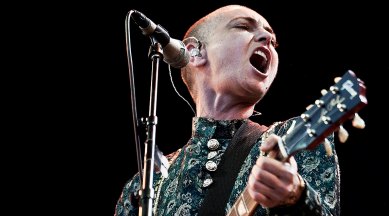Every issue O’Connor flagged was, some years later, acknowledged as a real problem: Mental health issues are no longer shameful secrets, with several celebrities openly talking about their struggles. The treatment of women in the entertainment business is now a widely-recognised problem

It might have seemed odd to many that seven years after she tore up a photograph of Pope John Paul II during a live television performance, in protest against the church’s inaction on allegations of child sexual abuse, Sinéad O’Connor was ordained as a Catholic priest. True, she became a priest of the Latin Tridentine Church, a breakaway from the Vatican — her ordainment was not recognised by the Roman Catholic Church as legitimate. Still, O’Connor’s move might have struck many, especially the fans who stuck by her after the backlash that followed her controversial Saturday Night Live appearance in 1992, as surprising, if not hypocritical.
The thing is, though, for O’Connor — more punk than most pop artists dared to be, with more raw talent and greater belief in her principles — the act wasn’t just about defying the Church or even the Pope. Tearing up the photo was intended primarily to break the silence around a long-festering issue, to draw attention to those whose pain has been systematically invisibilised. Even after the protest that made headlines around the world and made her a target of vitriol and even death threats — causing her pop career to take a nosedive that it never really recovered from — O’Connor maintained that she was a Catholic, that she hadn’t turned away from the religion that she had been raised in.
A spiritual person, her journey eventually led her to Islam, which many — perhaps recalling only the controversies, and not her convictions, intellect and passion — dismissed as a mere cry for attention.
You have exhausted your
monthly limit of free stories.
To continue reading,
simply register or sign in
Continue reading with an Indian Express Premium membership starting Rs 91 per month.
This premium article is free for now.
Register to read more free stories and access offers from partners.
Continue reading with an Indian Express Premium membership starting Rs 91 per month.
This content is exclusive for our subscribers.
Subscribe now to get unlimited access to The Indian Express exclusive and premium stories.
A cry for attention: This is an accusation that is often hurled at women who defy convention and expectations. O’Connor had no interest in playing by other people’s rules: When following the success of her debut album The Lion and the Cobra in 1987, she was advised to dress pretty and woo her audience with her feminine charms, O’Connor went ahead and shaved her head. Her exquisite voice and songwriting skills were enough, she believed. Maybe she was mistaken in that belief, because the world can’t resist punishing a woman who dares to go out of bounds — just ask Britney Spears. But what a rare, refreshing display of courage.
Was O’Connor troubled? It’s not as if she made a secret of it: Her terrible childhood, the exit of her father, her mother’s abuse and early death, a terrifying stint in one of Ireland’s infamous Magdalene laundries (now shuttered).
Music helped her escape this world, but the entertainment industry wasn’t much kinder: In her memoir Rememberings, she recalled being chased and terrorised by Prince, the man whose song ‘Nothing Compares 2 U’ she covered and made her own. And when the world went berserk over her defiant gesture on SNL, the industry all but turned its back on her, with colleagues — including Madonna and Frank Sinatra — ripping into her and audiences booing her during live performances.
Every issue O’Connor flagged was, some years later, acknowledged as a real problem: Mental health issues are no longer shameful secrets, with several celebrities openly talking about their struggles. The treatment of women in the entertainment business is now a widely-recognised problem and allegations of abuse, in the post-MeToo era, have led to some high-profile perpetrators losing their jobs. As for the problem that O’Connor sought to draw attention to that evening on SNL, in 2010 John Paul II’s successor Pope Benedict XVI apologised for decades of “systemic” abuse of children. The incumbent, Pope Francis has expressed regret more than once over the Church’s role in covering up the abuse of children, saying “we abandoned them”.
The real hypocrites are easy to spot today, thanks to the numerous tributes her death has generated, including from within the industry that once hung her out to dry. All O’Connor did was follow her heart’s call —- to music, to her politics, to the defence of the defenceless and to fresh spiritual shores. What more can a person be expected to do?
First published on: 29-07-2023 at 15:33 IST